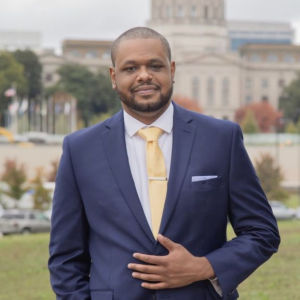Meet Chris Bowers, this year’s participant in the Tony Goldman Internship for Diversity in Preservation & Community Development. It’s been amazing to see Chris learn, grow, and influence our Marketing and Public Policy team over the past couple of months.
Recently, we sat down with Chris to learn more about his background and future in community development. We hope you enjoy getting to know Chris a little better through this quick Q&A.

How did you come to be interested in community development?
I grew up in a low-income community that sits east of downtown Houston called Fifth Ward. As I got older, I knew I wanted to return to the community and support revitalizing the area – I just was not sure how I would be able to do that. I grew up around wise people who instilled a well-known phrase of “never forgetting where I came from”. That has stayed with me and motivated much of my academic and career path. I hope to eventually take my knowledge and skillset back to Houston and play a role in supporting the community I came from.
What are the unique challenges of your hometown (Houston) and current city (Atlanta)? What are your favorite things about each city?
For Houston, the biggest challenge for years has been flooding. Many of the communities in Houston have been designed in a way that makes floodwater easier to stay around with nowhere to go. Our city uses bayous as its main drainage system, however, the city has no major levee system in place. When the city tries to drain the water quickly from one place to another, there’s the potential risk of harming another community.
I think mobility in Atlanta is presenting a challenge. It is not a unique challenge but it is prominent. As the city continues to grow, transportation has become increasingly important and it seems that the population growth is exponential and moving faster than transportation expansion.
For both cities, the culture is my favorite part. Houston and Atlanta both have growing international communities and I think it’s been a great experience to learn more about the music, art, food of different ethnicities. Both cities also have a growing live music scene. There seems to always be a live music event
What’s the single most effective tool a city has to affect change in its low-income communities?
I’ve studied the importance and benefits of community land trusts and feel like that is a great tool to make low-income communities more equitable. They leverage one-time public investments for long-term gains in affordable housing: By balancing wealth accumulation for an individual homeowner with the ongoing affordability needs of the community, CLTs serve generations of homeowners and help cities exit the revolving door of subsidies for affordable housing. Also, in targeting low-income households and giving communities of color greater access to the wealth-building opportunity of homeownership, community land trusts can also be effective in advancing racial equity.
What’s your dream job?
I think it’s tough to say because my dream role changes but what has remained consistent is looking at ways to improve the quality of life in communities of color while not displacing those who have lived there for years.
What’s the best career advice you’ve received?
“Never get tired of learning”. I feel that my curiosity has been a gift that allows me to explore learning opportunities
What advice do you have for young people of color wanting to work in this field?
Do not be afraid to ask questions. I am still learning that asking questions is more of a strength than it is a weakness.
A big part of your career has been spent advocating for marginalized communities. What can “lay” people do to join you in this work?
Find local community development corporations or CDCs in your area. Learn about some of the initiatives they are working on for communities. I think educating our fellow residents is very important because many times they are not aware of how there are resources in the community that supports the quality of life.
Who is an inspiration to you?
My parents. They have both given me important qualities that I’ve maintained over the years and will continue to carry. My mother always reminds me to think of how I can help the next person. My father has had a remarkable work ethic as a railroad engineer for several decades. Hard work and empathy are the cornerstones of any role that I have been in and will be in.
What’s the most rewarding professional project you’ve been involved in?
Last Summer, I was part of investing in a non-profit organization that is based in Washington D.C. to come to Atlanta. The organization focuses on closing the literacy gap in early childhood education in underserved communities. It was rewarding because it was about learning the needs of a community and finding a solution to that issue.